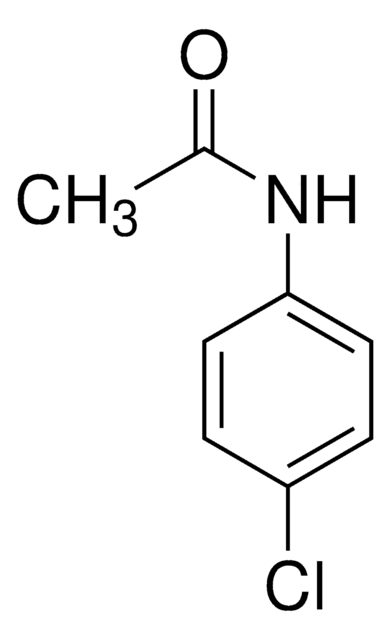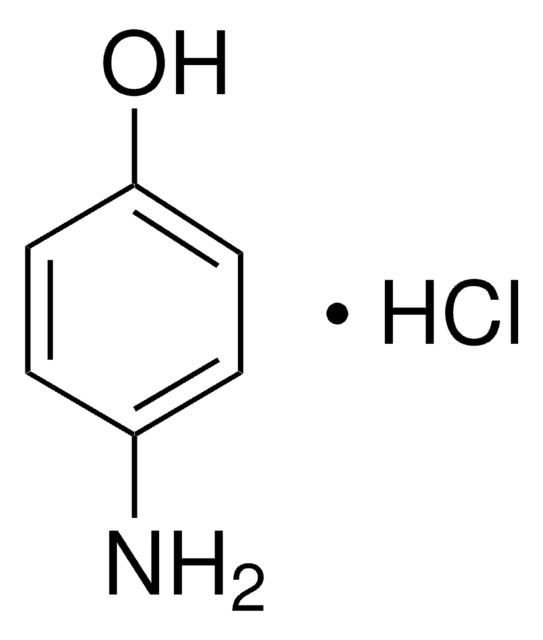PHR1148
4-Aminophenol (Acetaminophen Related Compound K) (Paracetamol Impurity K)
Pharmaceutical Secondary Standard; Certified Reference Material
Synonym(s):
4-Aminophenol, 4-Hydroxyaniline
About This Item
Recommended Products
grade
certified reference material
pharmaceutical secondary standard
Quality Level
Agency
traceable to Ph. Eur. Y0001955
traceable to USP 1021204
API family
mesalazine, paracetamol, acetaminophen
CofA
current certificate can be downloaded
technique(s)
HPLC: suitable
gas chromatography (GC): suitable
mp
185-189 °C (lit.)
application(s)
pharmaceutical (small molecule)
format
neat
storage temp.
2-30°C
SMILES string
Nc1ccc(O)cc1
InChI
1S/C6H7NO/c7-5-1-3-6(8)4-2-5/h1-4,8H,7H2
InChI key
PLIKAWJENQZMHA-UHFFFAOYSA-N
Looking for similar products? Visit Product Comparison Guide
General description
Pharmaceutical secondary standards for application in quality control, provide pharma laboratories and manufacturers with a convenient and cost-effective alternative to the preparation of in-house working standards.
It is a primary degradation product of the widely used antipyretic and analgesic drug acetaminophen, also known as paracetamol, formed on its hydrolysis.
Application
- Separation and estimation of acetaminophen and its process impurities in commercial acetaminophen tablets using high-performance liquid chromatography (HPLC)
- Simultaneous electrochemical determination of acetaminophen and its impurity K using a reduced graphene oxide-titanium nitride (RGO-TiN) nanohybrid
- Development and validation of HPLC-based stability indicating method for the determination of acetaminophen, chlorpheniramine maleate, and their possible degradation products in an over-the-counter syrup formulation
- Determination of acetaminophen, pamabrom, and their impurities using high-performance thin layer chromatography (HPTLC) and reversed phase-high performance liquid chromatography (RP-HPLC), according to the ICH guidelines, in their combined dosage tablets
- Combined analysis of acetaminophen, chlorzoxazone, and their major degradation impurities using thin-layer chromatographic (TLC)-densitometric method in their combined dosage capsules
Analysis Note
Footnote
Recommended products
related product
Signal Word
Warning
Hazard Statements
Precautionary Statements
Hazard Classifications
Acute Tox. 4 Inhalation - Acute Tox. 4 Oral - Aquatic Acute 1 - Aquatic Chronic 1 - Muta. 2 - Skin Sens. 1 - STOT RE 2
Target Organs
Kidney
Storage Class Code
6.1C - Combustible acute toxic Cat.3 / toxic compounds or compounds which causing chronic effects
WGK
WGK 3
Flash Point(F)
Not applicable
Flash Point(C)
Not applicable
Regulatory Listings
Regulatory Listings are mainly provided for chemical products. Only limited information can be provided here for non-chemical products. No entry means none of the components are listed. It is the user’s obligation to ensure the safe and legal use of the product.
PRTR
Class I Designated Chemical Substances
ISHL Indicated Name
Substances Subject to be Indicated Names
ISHL Notified Names
Substances Subject to be Notified Names
JAN Code
PHR1148-1G-PW:
PHR1148-1G:
Choose from one of the most recent versions:
Already Own This Product?
Find documentation for the products that you have recently purchased in the Document Library.
Customers Also Viewed
Our team of scientists has experience in all areas of research including Life Science, Material Science, Chemical Synthesis, Chromatography, Analytical and many others.
Contact Technical Service










